
Guests
- Dyab Abou JahjahBelgian Lebanese activist and founder of the Hind Rajab Foundation.
Belgian Lebanese activist Dyab Abou Jahjah, the founder of the Hind Rajab Foundation, discusses how the organization seeks to hold Israeli soldiers accountable for war crimes committed in Gaza. Named after a 6-year-old girl who was killed by Israeli forces in Gaza almost a year ago, the Hind Rajab Foundation uses evidence gathered from soldiers’ own social media to build cases against them. The group recently filed a complaint against a soldier in Brazil, leading a local judge to issue an arrest warrant for him that he only avoided by fleeing to Argentina. “Unfortunately, the Israeli government smuggled the soldier out of Brazil, which is, of course, obstructing justice,” Abou Jahjah tells Democracy Now! “We are relentless in seeking justice, and we are very convinced that one day justice also will be served in a court of law.”
Transcript
AMY GOODMAN: This is Democracy Now!, democracynow.org. I’m Amy Goodman.
We end today’s show with a look at a new effort to hold Israeli soldiers accountable, despite a climate of impunity, for crimes committed in Gaza. Last week, Poland adopted a resolution ensuring that Israeli Prime Minister Benjamin Netanyahu will be guaranteed safe entry to Poland to attend ceremonies marking 80 years since the liberation of the Nazi concentration camp at Auschwitz. Poland’s deputy foreign minister had said earlier Poland would comply with the International Criminal Court’s arrest warrants if Netanyahu visited Poland.
Here in the U.S., the House of Representatives voted last week to sanction the International Criminal Court over arrest warrants for Netanyahu and the former military chief Yoav Gallant.
But in Belgium, a nonprofit called the Hind Rajab Foundation filed a lawsuit Thursday against an Israeli soldier in Sweden who they accused of playing a direct role in the targeting of civilians and destruction of homes. Earlier this month, Israel’s Embassy in Brazil helped a 21-year-old Israeli army reservist flee Brazil after a Brazilian federal court ordered police to open an investigation into possible war crimes he committed in Gaza. That case had also been filed by the Hind Rajab Foundation. The Brussels-based nonprofit is named after 6-year-old Hind Rajab, who was killed, along with her family, in a January 2024 Israeli attack as they were in a car escaping bombardment in Gaza City, a story we covered extensively.
For more, we’re joined now in Brussels by Dyab Abou Jahjah, co-founder of the Hind Rajab Foundation.
Dyab, thank you for joining us. Explain what you are calling for. Talk about the Brazilian case and also the one in Sweden, and where you get your information about what these Israeli soldiers specifically have done.
DYAB ABOU JAHJAH: Thank you, Amy. Thanks for having me.
Indeed, as you said in your presentation, our mission is seeking accountability, seeking justice, basically. It is a sad thing that citizens, as ourselves, should be doing this, because normally this should be an automatic thing that states and legal bodies, international legal bodies, should be seeking. However, it is, of course, our right as citizens to do that when these countries mostly default on their responsibilities.
So, what we do is monitor the posts of Israeli soldiers, who have been extensively, as you know and everybody knows, posting things out of Gaza, out of the ongoing genocide there. And we look for criminal activity, because, you know, obviously, we only target soldiers who have posted things of themselves that we consider, legally speaking, as war crimes, at least, and maybe more than war crimes. So, this is the — you know, every research we do is open intelligence, open-source intelligence. So, this is how we function.
Once we have evidence, we pass it to our legal teams. They prepare cases, and then they file it when the subject enters a country that has jurisdiction, or, let’s say, activating jurisdiction of that country over these things. So, this is what happened in Brazil. This is what happened, before Brazil, in Cyprus, as well, and also, as you mentioned, in Sweden. So, this is basically our way of operating.
AMY GOODMAN: We only have a minute, but can you talk about the Brazil case of the Israeli soldier and, again, how you get the information about what they specifically did?
DYAB ABOU JAHJAH: Again, the information is posted by themselves. So, we analyze it, and we turn, you know, social media posts, basically, into legal cases.
I just want to — since you said we just have a minute, I want to take the opportunity to say that the countries of the world should take their responsibilities. As we speak, Major Ghassan Alian, who is the head of COGAT, which is the entity that oversees the weaponizing of famine in Gaza, is present in Italy to attend a meeting, secretly. We have filed a case against him in the International Criminal Court, asking them to activate any arrest warrant that they have against him or, if not, issue a new one. And we also informed the Italian authorities, asking them to activate their responsibility under the Rome Statute, since they have jurisdiction and since Major General Alian does not have immunity.
This is an example that is now unfolding of how countries of this world should take their responsibilities. And, you know, I think the Brazilian case was a case where that happened, where a judge actually issued a probe order to investigate a soldier. Unfortunately, the Israeli government smuggled the soldier out of Brazil, which is, of course, obstructing justice. But we are continuing. We are relentless in seeking justice, and we are very convinced that one day justice also will be served in a court of law.
AMY GOODMAN: Thank you so much for staying with us for Part 2 of this conversation. Why don’t we start with why you called this foundation, why you named it after Hind?
DYAB ABOU JAHJAH: Thank you for having me again.
The main reason that we have called this foundation after Hind is because her case, her murder, is an example, a very, you know, extreme example, of the genocide that was ongoing in Gaza and the fact that children have been also the main victims of this genocide. This is something that is, if you look at the statistics, very clear. But also, the total impunity under which the Israeli army acted in this case illustrates the absolute atmosphere, let’s say, of this whole genocide, as you stated rightfully. You know, for example, when an ambulance was sent to save Hind, the people in the ambulance were also targeted and killed. But also, the Hind story was unfolding under the eyes of the whole world as it was going viral, and everybody was aware that a 6-year-old girl is stuck in a car among the dead bodies in a very macabre setting of her family, and that even did not change anything of how the Israeli army treated this. So, I think it’s very telling about everything. And justice for Hind, for us, is equal to justice for every victim of the Gaza genocide.
AMY GOODMAN: I wanted to go to that day, January 29th, 2024, when 6-year-old Hind Rajab climbed into a car with her aunt, her uncle and cousins in Gaza City as they prepared to flee to the southern part of Gaza. But as they were in the car, an Israeli tank approached them and opened fire. Hind’s 15-year-old cousin Layan called the Red Crescent for help. She was in the car. These were Layan’s last words, recorded on the call with the Red Crescent dispatcher.
LAYAN HAMADEH: [translated] Hello,
OMAR AL-QAM: [translated] Hello, dear.
LAYAN HAMADEH: [translated] They are shooting at us.
OMAR AL-QAM: [translated] Hello.
LAYAN HAMADEH: [translated] They are shooting at us. The tank is next to me.
OMAR AL-QAM: [translated] Are you hiding?
LAYAN HAMADEH: [translated] Yes, in the car. We’re next to the tank.
OMAR AL-QAM: [translated] Are you inside the car?
LAYAN HAMADEH: [screaming]
OMAR AL-QAM: [translated] Hello? Hello?
AMY GOODMAN: So, that was the dispatcher trying to reach Layan, who was killed along with the rest of her family in that car. The only one who remained alive in the car was this 6-year-old little girl Hind. Wounded, she called the Red Crescent back, pleading with the dispatcher to help her.
HIND RAJAB: [translated] Come take me. You will come and take me?
RED CRESCENT DISPATCHER: [translated] Do you want me to come and take you?
HIND RAJAB: [translated] I’m so scared. Please come. Please call someone to come and take me.
RED CRESCENT DISPATCHER: [translated] OK, dear, I will come and take you.
AMY GOODMAN: That dispatcher stayed on the phone with little Hind for something like three hours. After seeking approval from the Israeli military, two emergency workers with the Palestine Red Crescent, Yusuf Zeino and Ahmed al-Madhoun, went to try to rescue Hind in the car, but dispatchers lost contact with the medics. Nearly two weeks later, Israeli forces finally withdrew from the area, and Hind’s surviving family ventured back to the neighborhood. They found Hind dead inside the car along with the bodies of five of her family members, the car riddled with bullet holes. The bodies of the two emergency workers were also found in an ambulance nearby and appeared to have been killed by Israeli fire just yards away from the car. This is Hind’s mother, Wissam Hamadah, after she learned of her daughter’s killing,
WISSAM HAMADAH: [translated] My heart is completely destroyed over my daughter. Two weeks, they killed them. Two weeks, they were in that car. I’ve told the world from day one, “Please, go get Hind.” God is the only one sufficient for us. Everyone failed us. I will tell God on the day of judgment about my daughter. I swear I will never forgive you or any human involved or any human rights organization.
AMY GOODMAN: So, that is the story of Hind Rajab. And let me ask you, Dyab Abou Jahjah, what happened legally in this case, in the case of Hind, her cousin Layan, the whole family, and the two paramedics who were killed? What kind of investigation has been done?
DYAB ABOU JAHJAH: As far as we are informed, any form of investigation on the ground is made impossible by the Israeli army. So, it is not only very dangerous, it is a direct reason that the Israelis consider as a direct reason to deploy military action to stop an investigation, which is the case also for most of things that are happening in Gaza right now. However, there’s enough research that has been done on the forensic level, on open-source intelligence level. And, you know, I think end of this month we will have some important information. On the annual, on the 29th of January, we will communicate, as the Hind Rajab Foundation, something very important in that regard.
AMY GOODMAN: So, now I want to go to the Brazilian case. In Part 1 of our conversation, we talked briefly about this. But this is about an Israeli soldier named Yuval Vagdani, under investigation in Brazil for his role in planting explosives and destroying entire neighborhoods in Gaza. You filed a 500-page report, pages of evidence against him, before the Israeli diplomatic staff in Brazil took him out of Brazil. Talk about the Brazilian court and what it was calling for, and what you’re calling for right now.
DYAB ABOU JAHJAH: Right. Well, it is a very important case, because the evidence was damning. Mr. Vagdani posted a lot of information, but also members of his platoon posted a lot of information that proves his personal involvement. I mean, just to make it very, very clear, we have him on video planting the explosives and posing in front of the explosives, and then we have him on video exploding these houses. To clarify also, these houses are property of civilians, Gazan civilians, who have nothing to do with any organizations or any political movements. One of them, which is our main plaintiff in this case, has even a work permit in Israel, which means that he undergo — underwent a lot of scrutiny from the Israeli government before being issued such a permit. So, there’s no possibility that there’s any military justification for these acts.
So, what happened in Brazil is that based on the importance of the evidence, the prosecution asked the judge to look at it, which is the first hurdle in any legal case. The judge had a look at it and issued an order, acknowledging our request, issued an order to investigate, to probe Mr. Vagdani, who was at that moment vacationing in Brazil. This is a breakthrough on the legal level, because it’s the first time that a judge and a signatory state of the Rome Statute acts upon the Rome Statute without an ICC warrant. This is why it is a legal breakthrough. It might sound technical, but it’s a very important precedent.
So, after that moment, we realized, because we hadn’t communicated about the case — we do not communicate about our cases unless it’s necessary. So, at that moment, we realized that the subject was aware of the case. There was some leak somewhere. We cannot know where. We do not know where or how. But at that moment, we did communicate on the case. Unfortunately, the Israelis smuggled him out of Brazil, recognizing also de facto the seriousness of this case, because, you know, otherwise, like I always say, if you are being sued, basically you can just take a lawyer. But in this case, I think, like in many other cases, it was clear that if Mr. Vagdani will, you know, stand before a judge, that the chances are very big that he will be arrested and held in Brazil.
AMY GOODMAN: Dyab, your organization has caused panic in Israel. In fact, the Israeli military has warned its soldiers that they could face arrest while traveling abroad over crimes committed in Gaza. Your response?
DYAB ABOU JAHJAH: Well, it’s very telling that the Israeli military communicates in this way. I think, you know, under any Geneva Convention that governs the law of war, I think the Israeli military has the responsibility itself to investigate war crimes and to arrest, itself, through its military police, such individuals and also to court-martial them. So, it’s very telling that and very unfortunate that the Israeli army, but also that Israeli politicians, instead of, you know, taking their responsibilities, as they claim to be a state of law — at least this is their claim — that they actually are telling their soldiers to not go to certain countries because they could face legal consequences. And they are even — you know, the most cynical part of is that they are asking soldiers not to post their crimes, instead of asking them not to commit their crimes.
AMY GOODMAN: And can you respond to Poland reversing their possession, originally saying they would arrest Netanyahu, the prime minister of Israel, if he came to Poland for the 80th anniversary of the liberation of Auschwitz, but then you have the foreign minister, the — sorry, the Polish prime minister, Donald Tusk, confirming he would not be arrested? If you could respond to that, and then to the vote taken in the U.S. House of Representatives, by Democrats and Republicans, voting to sanction the ICC for issuing those arrest warrants for Netanyahu and the former Defense Minister Yoav Gallant?
DYAB ABOU JAHJAH: Right. Let me start by saying, regarding the Poland thing, that this has a lot to say on Poland and nothing to say on Mr. Netanyahu. Mr. Netanyahu is an indicted war criminal through the ICC. There is an arrest warrant under the — on him, and Poland is a signatory of the Rome Statute and must execute that arrest warrant if it is a state where the rule of law is upheld, if it is a state where the separation of powers is upheld, because a politician, whether it’s the president or a prime minister or whoever, has normally, in a normal state of law, nothing to say on the application of the law. So, this is one thing. And I think this is a test for Poland. Poland has to make up its mind. And Mr. Tusk, who is a democrat and who is somebody who is respectable, must make up his mind. Is his country going to be a state that upholds international conventions and the obligations toward the ICC or not? So, this is, I think, one very important thing regarding Poland itself.
On the other hand, looking at the resolution voted in the American Congress, I think it’s very worrying, of course. But again, I think it’s the same, the same thing. On the one hand, of course, we understand that the United States is not a signatory of the Rome Statute. So, if the United States wants to say, “We will not execute any arrest warrant,” that’s understandable under international law. But, you know, to go from there, which could be defendable from a legal perspective, to sanction the ICC, which is a legitimate international legal body, for issuing an arrest warrant against an indicted war criminal — and to be clear, it’s not the prosecutor who issues an arrest warrant. The prosecutor asks for it. And it’s a large body of, I think, 12 judges, if I’m not mistaken, that issues the [warrant] — among them, an Israeli judge. And, you know, to consider these people as if they are the criminals, I think this is a very sad day for American democracy, because democracy is about the rule of law. Democracy is not about elections. If democracy was about elections, many countries who are not at all democratic could claim being democratic. The main thing in democracy is the separation of powers and the rule of law. And this is also valid on the international level.
So, to issue such an intimidation, threats, actually, to want to put — wanting to put sanctions on judges, who are doing nothing but follow the legal order and follow their own, let’s say, professional conscience, this is very, you know, troubling. And I think, on the one hand, it will not change anything, again, because, you know, political decisions could never stop the legal procedures. Wars, crimes against humanity do not actually lose their validity with time, so one can wait five years, 10 years, 15 years to uphold these rulings. But on the other hand, I think it’s, again, a problematic thing for the United States itself. I think the American people should look at this as a very important and a very troubling evolution.
AMY GOODMAN: I’m wondering —
DYAB ABOU JAHJAH: Or, development, I mean.
AMY GOODMAN: — if you could respond to the Israeli media calling you an Islamist extremist, saying what you’re doing is doxxing Israeli soldiers, an Israeli official telling you to keep an eye on your pager, which of course refers to what happened in Lebanon when thousands of pagers blew up, and the Israeli military ultimately took responsibility for this, Dyab.
DYAB ABOU JAHJAH: Right. Well, these fabrications against my person are not new. They have been, you know, launched in 2000, when I was involved in a legal case, also against a prime minister at the time, Ariel Sharon, for his role in the Sabra and Shatila massacre. So I will not delve too much into that. This is, in my view, like typical hasbara. That is, you know, if they even call judges at the ICC to be terrorists, or whatever they use as terminology, I mean, of course they will try to throw that at me. So, this is irrelevant, I think, how they look at me. Also the threats against me are irrelevant, because our work is collective. It’s not dependent on my person. I’m just a spokesperson. I’m here to represent the organization, but the organization has thousands of volunteers globally who all work on research, on legal preparation. So I think that train had has left the station. They cannot stop this. They can, you know, only throw mud at us, but this will not deter us.
And especially, I think this is not the way how states should act with such things — intimidation, threats. These are practicals of criminal organizations. I think the state of Israel, if it takes itself seriously as a state of law — which is at the moment clearly not the case — should seek legal counsel and should answer in a court of law. If there’s nothing but doxxing, as they claim, well, fine, then any judge will dismiss our cases out of hand. And again, communicating the names, sometimes, not always, because most of the time we do not communicate names, but when we do that, first of all, it’s the right of plaintiffs. Just like when people filed cases against Harvey Weinstein, they said, “OK, we are suing Harvey Weinstein.” We are not a media organization to hide names, but we never do doxxing. We are opposed to doxxing. We even condemn doxxing. We only communicate the name of people we are suing, which is the right of any plaintiffs under any international or local law. So, this is what we’re doing.
AMY GOODMAN: How would you compare yourselves to the Simon Wiesenthal foundation? I mean, for years went after Nazi perpetrators in places like Argentina or anywhere on Earth that they could find them. Do you model yourselves on them?
DYAB ABOU JAHJAH: Well, the Simon Wiesanthal Center is something — I mean, it’s humbling to compare us to them. They have done great work in the chase against Nazi criminals after the Holocaust, which was instrumental in upholding these principles that we are trying to uphold today. So, in that sense, absolutely an example, and it’s honoring and humbling to be compared to them, even though we might have some political differences. But this is on the side, because, you know, it’s about the law, and it’s about the principles of justice. So, on that level, we are totally identical to them. We operate the same way. We think the same way.
But I must also say that in the political or in the environment where we are operating, our task is much more complicated, because, as you know, when the Wiesenthal Center was chasing Nazi criminals, everybody was against Nazis. Nazi Germany had been defeated. There was no backlash. There was no pushback, you know. So that was an advantage, luckily, for the Simon Wiesenthal Center. I think, in the case of the Hind Rajab Foundation and everybody, including also international legal bodies much more important than us, like the ICC, we are facing a backlash. We are facing even criminalization by the most powerful country on this planet. And, you know, there are also rumors that we will be included on the American sanction list. So, things are not the same. We are operating in a much more difficult environment, much more dangerous environment. But, au fond, we have the same, let’s say, motivation and the same mission, and which is that genocide is something that should not be allowed to happen without accountability, and that hopefully, one day, we can say, “Never again,” everywhere, for everybody.
AMY GOODMAN: Dyab Abou Jahjah, we want to thank you for being with us, co-founder of the Hind Rajab Foundation, the Belgium-based group advocating for Palestinian rights. To see Part 1 of our conversation, go to democracynow.org. I’m Amy Goodman. Thanks for joining us.

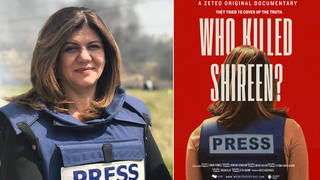
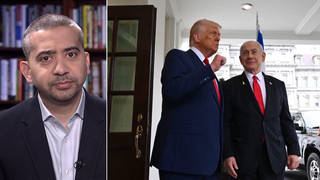
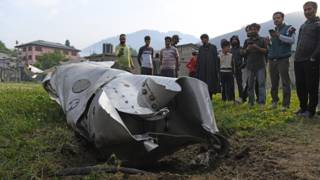
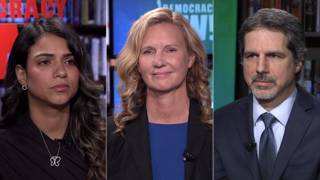






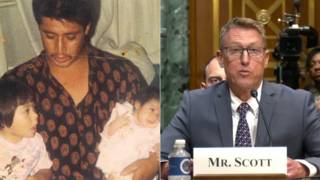
Media Options